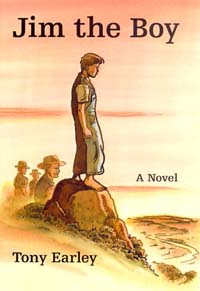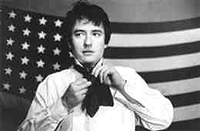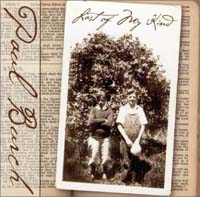|
 |
Tony Earley writes stories
of the South, with a sense of history—not
the broad strokes of school books, but the details of
everyday life that build a time and place. A man recounts
the local myths of his town as his beard grows ever longer,
a boy sees beyond his childhood world or a narrator mourns
that the local professional wrestlers have packed up their
BMWs and left Charlotte for Atlanta. These, too, are the
routes that Nashville singer/songwriter Paul Burch’s
music travels. With ballads and ditties that would do
Hank Williams and Johnny Cash proud, Burch conjures images
of trailerparks and truckstops, love and love gone wrong—the
simple ins and outs of living that sculpt the nuances
of existence. It seems fitting, then, that the two friends
should collaborate, and maybe that’s the best way
to describe Paul Burch’s album Last of My Kind.
Earley provided the narrative with his Twain-esque,
depression era novel Jim the Boy, and Burch composed
the first soundtrack to a book (that I know of, anyway),
not just to capture the characters and the mood in music,
but to give the book a set of songs that could have come
from the world contained between its covers.
* * *
Paul Burch has the same
glasses as my girlfriend. They’re small and rectangular—on
a girl they look sexy, but on a guy they’re endearing
and a little bit impish. They make Burch look quite a
lot like Sean Lennon as he stands alone on stage, opening
for alt-country wunderkind Ryan Adams, at the Theater
of the Living Arts in Philadelphia. Burch asks the crowd
if he should leave the new glasses on or off. Philadelphia
says "leave them on." Boston told him to take them off,
he informs us. "My beautiful wife picked them out for
me," Burch later tells me about the glasses. "And, although
I find them quite stylish and suave-looking, to see an
audience through them makes it appear that I’m watching
a letterbox movie on a small screen."
 |
If Paul Burch’s view
is cinematic, though, it is definitely a big screen affair.
Think Altman’s Nashville, or character movies
with lots of close-ups. His songs require the space for
subtlety, like emotions playing across a film actor’s
face. Burch’s set at the TLA is sublime, calmly moving
from one tune to the next, wrapping the audience in the
storytelling. Even the faster numbers feel hushed,
and a small crowd, enough in-the-know to catch a brilliant
opening act, stands transfixed. I can’t help feeling
that its for performances and connections like these that
Paul Burch became a musician. In the liner notes to Last
of My Kind, he explains, "When I was Jim Glass’s
age, I found a picture of Roy Acuff and his Smokey Mountain
Boys performing in the late 1930’s. Since the photo
was taken from behind the band, you could see the audience
paying rapt attention as Acuff—fiddle
in hand, singing into the sole microphone—led
the Boys, probably in a version of 'Precious Jewel': '…way
back in the hills as a boy I wandered.' One day, I thought,
I wanted to play in a band like that." At the TLA, Burch
is there, his boyhood dream in full effect. He tells the
audience, only half joking, "I’m trying to save country
music from itself."
Ryan Adams’ performance
is something entirely different—a
full scale rock and roll event, where you could hear Black
Flag and Elton John covers side by side. And when Adams’
calls Burch out to join the band, we get a complete idea
of the country troubadour’s diversity. Though Adams
claims that Burch is having a bad day, you’d never
know it to see him. He sits in for almost all of Adams’
show, rocking along on his acoustic guitar with such energy,
enthusiasm and, seemingly, bountiful happiness. Burch
speaks fondly and humorously of his experience on tour
with Adams when I ask him about it. "Well," he responds,
"so far I’ve sung with Elton John, beat Ryan twice
at pool, played to 10,000 more people than I had the week
before, made my house payment and learned how to pee on
a moving bus while it drives in rush hour traffic. It’s
been a good tour, thanks for asking."
* * *
 |
Paul Burch is barely more
serious when discussing his album, Last of My Kind.
His friendship with Tony Earley, and the collaboration
that grew out of it, began when the two worked connected
day jobs. Burch’s explanation is characteristically
self-deprecating. "Tony and I worked at Vanderbilt—he
as a teacher, and I as a shoe polisher." He continues,
a little more earnestly, "I used to be the secretary to
send his manuscripts to his editor in New York City. After
reading the near-finished proof [of Jim the Boy],
I called him to tell him how much I liked his book and
offered to write some songs on what I thought so we could
do a reading and musical performance for Nashville’s
Southern Festival of Books. Tony kindly said, ‘go
for it,’ and, to my surprise, an album was written
in about two months." The album that Burch speaks of has
the sound of the Carter Family, the feeling of Harry Smith’s
Anthology of American Folk Music and is as compelling
as the popular and critically acclaimed soundtrack to
the Coen Brothers' film O Brother, Where Art Thou.
Burch explains in the record’s liner notes, "My
intention was to compose a kind of musical Shakespearean-like
aside so the characters could speak to us as they would
to their souls." The effect is stunning. The songs are
as intimate and personal as someone’s inner dialogues,
whether Burch is singing about the game of life "up on
the mountain where the honeysuckle grows…the world
below laid out plain for me to see like a board of Monopoly,"
("Up On the Mountain") or recounting the story of a murderous
farmer in the spooky "Harvey Hartsell’s Farm." "For
awhile I had wanted to make a record that was pretty straight,
what we now call old time country," Burch tells me. "And
I had wanted to approach songwriting from some other direction
other than personal/journal type writing or craftsmanship
writing. Writing Last of My Kind was, for me, an
opportunity to do just that. An attempt to do some kind
of ‘pure writing,’ a combination of personal
and craftsmanship writing. It was like a kind of writing
puzzle. In the end, the record did become personal but
within the context of these near flesh and blood characters."
It sounds like Burch is a novelist, and the result of
his "writing puzzle" is consistent with this notion: a
period album that sounds from the past but with a contemporary
relevance and resonance that make it just as poignant
as a current historical novel—Burch
just might be rescuing country music from itself.
 |
Tony Earley gives Paul
Burch the greatest praise for Last of My Kind. "I
found the songs so dead-on in voice and feeling," Earley
says in the liner notes, "that hearing them was actually
eerie. I had the distinct and unexpected pleasure of hearing
characters that I had created saying things that I hadn’t
written. These people that I have come over the years
to think of as real never seemed to me more alive than
they did as I listened to Paul’s songs."
The breadth of Burch’s
aspirations stretch wide. He ponders, sincerely I think,
"I would like to hear these songs on a musical or Broadway
stage. That would be hip." When I ask Burch if he would
ever consider doing a soundtrack for a film, his response
is extremely positive, and when I question what kind of
movie it would have to be, he is jokingly glib: "one that
pays," he says. As for doing more songs to books? Burch
gets serious. "I’m sure I would try to write songs
around a book again, but it won’t ever be quite the
same. This was a really extraordinary event for me. It
came at a good time when so many other things in my life
were new."
|